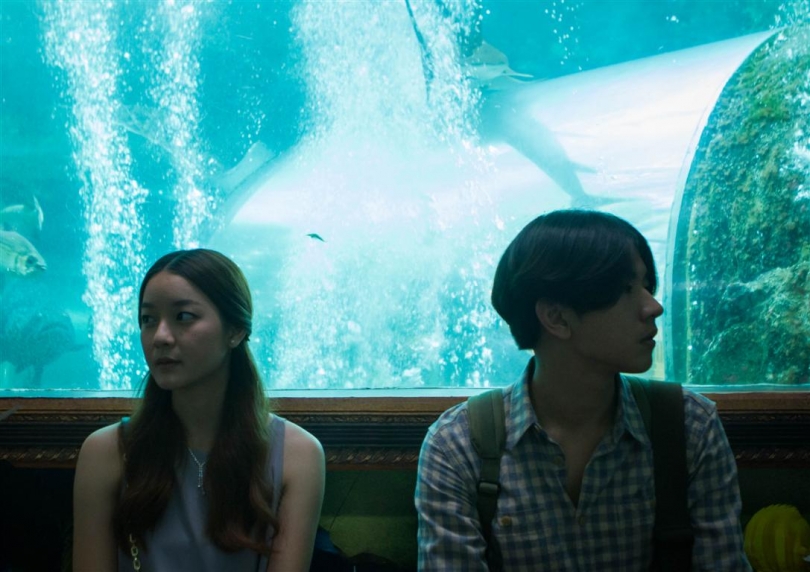The pieces ‘Snap' into place

Millennials experience life unfiltered in Kongdej Jaturanrasmee's new film
MILLENNIALS WAKE UP and smell life – unfiltered – in “Snap”, a sharply observed romantic comedy-drama from writer-director Kongdej Jaturanrasmee.
Laden with the hashtags and colour-saturated photos of social-media posts, “Snap” has young Thais reflecting wistfully on the not-so-distant past as pessimism emerges about their impending adulthood, and, possibly, about the future of Thailand itself.
Set just as the military declared martial law last year, “Snap” is the story of Pueng (delicate singer-actress Waruntorn Paonil in her feature debut), the daughter of an army colonel who is set to marry a junior officer. She is one of those people who feels compelled to photograph everything with her phone – the coffee she’s about to drink, the food she’s about to eat, the nature vista she’s just seen – and post the snapshot to Facebook and Instagram, all heavy with descriptive nonsense hashtags.
Before her own big day, Pueng accepts an invitation from high-school friends to attend their wedding in her former hometown of Chanthaburi. There, she’s reunited with her old classmates, including her ex-boyfriend Boy (the quietly intense Toni Rakkaen), a local photographer who happens to also be shooting the wedding.
Melancholy wells up as Pueng revisits her old high school and goes looking for the bench where she and Boy spent their days. The dusty old wooden seat, still with the graffiti markings on it, has been relegated to the school’s rooftop, and no longer holds any significance to the current crop of kids.
Turns out there is little of Pueng left for Chanthaburi locals to remember either, as she left rather abruptly some years before, thanks to a sudden transfer of her military father. As a consequence, Pueng’s picture has been left out of her high-school yearbook, but her presence is still felt by the inclusion of dotted-line-bordered blank spaces in group photos. A second dotted-line figure also appears in many photos, that of Boy, who as the yearbook photographer was behind the lens and not in the frame. They are ghosts in the photos, and those blank spaces represent holes in their souls. Pueng and Boy wonder if those holes can still be filled.
Here, Kongdej is also trafficking in nostalgia for the old film-photography days, and the tactile feeling of developing the rolls of negatives and making the prints. It’s a subject previously referenced in fellow Thai director Nawapol Thamrongrattanarit’s abstract “36”. There is also comment on the ridiculously epic proportions wedding-photo shoots have taken on in recent years, something Nawapol observed earlier this year in his “Freelance” (“Heart Attack”). Seems there is something on the minds of Thailand’s great movie makers.
The wedding couple are the a-dork-able bespectacled nerds Poo (Soifa Saenkhamkon) and her man Aey (Chakphet Goontong), who met on an online dating site. Poo tells the hair-curling story of their sex-filled first meeting, and rather than flash back to it, Kongdej lets the impact of their coupling register on the faces of Pueng and others.
Pueng, meanwhile, tells the group how she met her husband-to-be, the army officer Mann, who was her teacher at university, and they didn’t exactly hit it off at first. But Mann kept turning up, and really, he’s a sweet guy, though a bit clueless. He goes so far as to ask Boy to photograph his and Pueng’s wedding. Which probably isn’t the best idea. I mean, just look at Pueng and Boy, who seem drawn together like characters out of a manga novel. The connection between Pueng and Mann, on the other hand, appears strained.
Later on, Pueng wants to test the waters of her past relationship with Boy, and the two meet for a late-night reunion at Chanthaburi’s Kung Kraben Aquarium, where the swirls of ocean life and the bubbling water provide a dramatic backdrop for reminiscing.
“How come nothing is as good as it used to be?” That’s the utterance of the frustrated and profoundly depressed Pueng when the gravity of her situation – her own marriage, the junta, the pointlessness of sharing so many darn photos – hits her.
I can’t recall a Kongdej film, especially those of his late “indie” period, that’s looked better, thanks to director of photography MR Umpornpol Yugala, production designer Rasiguet Sookkarn and art director Manop Chaengsawang. In contrast to the movie’s sad, beautiful heroine, the look of “Snap” is cheery, colourful and pops right off the screen.
“Snap” is also possibly the most poignant and also the most ordinary film yet from Kongdej. His usual stock-in-trade has been unusual characters, such as a young woman running a smut magazine in “Sayew”, a taxi driver in love with a massage-parlour girl in “Midnight My Love” and the three-armed man on a road trip with a large-breasted woman in “Handle Me With Care”. The writer-director turned away from studio-driven projects to make smaller independent films with his 2011 feature “P-047”, which was perhaps his most unusual film to date, with an abstract story of a locksmith who loses the key to his identity. But he’s since become more grounded, covering Bangkok boys on the fringes in the drama “Tang Wong” and boys in Buddhist temples in his documentary “So Be It”. Fatherhood has had an effect (he made a short documentary, “Udon”, featuring his twin daughters) and Kongdej is viewing the world in ways that aren’t the same as before.
CLICKED IN
- “Snap” premiered in competition at the Tokyo International Film Festival and had its Thai premiere at the 13th World Film Festival of Bangkok.
- It’s now in sneak previews in Thai cinemas, with screenings from around 8 nightly. It will have a wider release next Thursday.
- For more details, check www.facebook.com/Snap-154074711605127.





